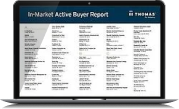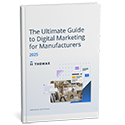Event Lead Generation: Definition, How To Generate, and Technology Used
Team Thomas May 16, 2024
Event lead generation is the process of attracting and converting event attendees into prospects with a potential interest in a company's products or services. At its core, it's about creating valuable interactions that capture participants' attention, whether through a trade show, conference, webinar, or any other type of event. This strategy is pivotal in marketing as it provides a unique opportunity for businesses to engage with their target audience in a live setting, fostering a more personal connection and understanding of customer needs.

The potential of event lead generation to produce a lead pipeline of prospects that can be developed and turned into sales makes it significant. Making sure the leads are relevant and have a better likelihood of moving through the sales funnel is more important than merely getting a lot of them. Marketers can improve the lead-generation process by streamlining it and using the appropriate technology, such as Customer Relationship Management (CRM) systems, event-management software, and data-analytics tools.
This article will discuss event lead generation, how to generate it, and the technology used.
What Is Event Lead Generation?
Event lead generation is a strategic marketing process in which businesses identify and cultivate potential customers through various types of events such as: conferences, trade shows, product demonstrations, and webinars. This approach is integral to both B2B and B2C marketing strategies, as it allows companies to directly engage with prospects, showcase their expertise, and build relationships that could lead to future sales.
The purpose of event lead generation is to draw attendees who want to learn more about the products and services offered by the organization and direct them along the sales funnel. Making connections with the right people who are more likely to become clients is more important than simply drawing a large crowd. Businesses commonly employ a mix of pre-event advertising, in-person contacts, and follow-up communications to accomplish this.
Event lead generation is also known by other terms, depending on the context and focus of the event. For instance, when the event is a conference, it might be referred to as conference lead generation. Other variations include exhibition lead generation or seminar lead generation, highlighting the specific format of the event being utilized for lead-generation purposes.
Creating meaningful experiences and interactions that connect with guests is the fundamental component of event lead generation, as it transforms their interest into actionable leads for the company. It's an engaging and dynamic approach to increase a business's visibility and influence in its intended market.
How to Generate Leads at Events
Maximizing lead generation at events requires a strategic approach that encompasses various stages of the event life cycle. Here are some strategies to consider:
- Pre-Event Teasers and Announcements: Build anticipation by leveraging social-media and email marketing to create a buzz around your upcoming event. Offer sneak peeks or early-bird specials to entice potential attendees.
- Attractive Event Booth or Display: Create a unique and captivating booth or exhibit. To pique participants' interest and promote dialogue, include captivating graphics and interactive components.
- Compelling Value Proposition: Clearly articulate the benefits of your products or services. Develop a message that resonates with your target audience and highlights what sets you apart.
- Interactive Activities: Provide activities that will entice people to participate. Live demos, surveys, and contests can generate attention and present chances to collect leads.
- Technology for Lead Capture: Utilize technology such as lead capture apps or digital lead portals to efficiently collect attendee information.
Event Lead Generation Technology and Software
The advent of technology has significantly enhanced the capabilities of event lead generation, providing marketers with powerful tools to attract, engage, and convert leads more effectively. Some common event lead generation technology and software are listed below:
- Event Apps: When it comes to live events, these smartphone applications are revolutionary. They act as a digital center for participants, offering agendas, details on speakers, chances for networking, and more. Event applications provide real-time analytics and tracking of attendee activity to organizers, enabling them to enhance lead generation and customize the event experience.
- RFID (Radio-Frequency Identification): RFID tags and readers have transformed the way attendee data is collected at events. By embedding RFID chips in badges or wristbands, organizers can track attendee movements, session attendance, and even control access to different event zones. This data is invaluable for understanding attendee preferences and tailoring follow-up communications to generate leads.
- Virtual Events: Virtual events are now a standard component of lead-generation campaigns due to the growth of remote employment and digital communication. They free companies from the limitations of physical location and enable them to reach a worldwide audience. In addition to gathering information on participant engagement and interests, virtual-event systems can mimic many elements of live events, such as networking opportunities, keynote addresses, and breakout sessions.
How to Measure the Success of Event Lead Generation
Measuring the success of event lead generation is important for understanding your marketing efforts' impact and making data-driven decisions for future events. The effectiveness of event lead generation can be gauged through several key performance indicators (KPIs) such as:
- Event Check-Ins: This indicator shows how many people have registered for the event. This figure can give information about the popularity of the event and the success of pre-event marketing when compared to the total number of registrants.
- Event Surveys: Conducting surveys before, during, or after the event can help gauge attendee satisfaction and collect feedback on their experiences. This immediate feedback is valuable for understanding what worked well and what can be improved.
- Net Promoter Score (NPS): NPS calculates how likely it is that participants will tell others about the event. An event that succeeds in terms of participant involvement and satisfaction has a high net promoter score (NPS).
- Qualified Leads: If the event's goal is to generate prospects for the sales team, measuring the number of qualified leads is essential. This involves having detailed criteria for what constitutes a qualified lead for your company.
- Engagement Metrics: Metrics like chat engagement, virtual applause, and session attendance for virtual events can reveal how involved participants were with the program and the event.
- Goal Setting and Tracking: Establishing and monitoring KPIs related to the number of leads collected, the quality of those leads, and the sales closed can offer valuable insights into the event's success and return on investment (ROI).
By tracking these KPIs, you can measure the effectiveness of your event lead generation and identify areas for improvement. This will help you refine your strategies and ensure that future events are even more successful in generating high-quality leads.
Advantages of Event Lead Generation
Event lead generation stands as a cornerstone in marketing, offering many benefits that can significantly strengthen a company's outreach and sales efforts. Here are some of the key advantages:
- Direct Interaction With Prospects: Events offer a special setting for direct conversations with prospective clients. Through more intimate ties and the development of trust, this direct involvement makes it easier to comprehend the needs of the consumer.
- Enhanced Brand Visibility: By hosting or participating in events, companies can increase their brand exposure and visibility. Events serve as an ideal stage to showcase products and services, leaving a lasting impression on attendees.
- Quality Lead Collection: Events tend to attract individuals who are already interested in the industry or specific products, leading to the collection of high-quality leads. These leads are more likely to convert into sales, as they have shown a genuine interest by attending the event.
- Networking Opportunities: Events are hubs for networking, giving companies the ability to establish connections with colleagues, business leaders, and possible partners in addition to prospective clients.
- Market Insights: Through interactions and feedback received during events, companies can gain valuable insights into market trends and customer preferences. This information is crucial for tailoring products and marketing strategies.
- Immediate Feedback: The live nature of events allows for immediate feedback on products or services, allowing companies to address concerns or highlight features in real time.
Challenges in Event Lead Generation and Solutions
Event lead generation is pivotal for the success of any event, but it comes with its own set of challenges. Here are some common hurdles and practical solutions:
- Identifying Qualified Leads: Finding qualified leads is one of the main obstacles. A wide range of people attend events, but not all of them may be prospective clients. Implement a multi-faceted approach to engage attendees. Use breakout sessions and roundtable discussions to cater to specific interests within your target audience.
- Personalizing at Scale: Scaling up the personalization of communication is another problem. It's important to engage in meaningful conversation with guests without being forced. Leverage technology to streamline personalization. Use CRM systems to track attendee preferences and tailor communications accordingly.
- Measuring ROI: Measuring the return on investment (ROI) and lead-generation performance can be tricky. Set clear objectives and use analytics tools to track event metrics like attendee engagement, lead-conversion rates, and overall event success.
- Follow-Up Strategies: Neglecting post-event follow-up can result in missed opportunities. Develop a structured follow-up strategy. Use automated email sequences to nurture leads and keep your event top-of-mind.
- Budget Constraints: Budget limitations can restrict lead-generation activities. Focus on cost-effective strategies like social-media marketing and partnerships with influencers to extend your reach without breaking the bank.
By addressing these challenges with the right strategies, you can enhance your event lead generation efforts and ensure a higher conversion rate of attendees into qualified leads.
About Thomasnet®
Thomasnet.com® is trusted by millions of industrial buyers who have leveraged our content and expertise. We connect buyers, engineers and MRO professionals to more than 500,000 North American manufacturers daily. Reaching these in-market buyers starts with building a comprehensive Company Profile.
Get Listed Today https://business.thomasnet.com/programs
Did you find this useful?





